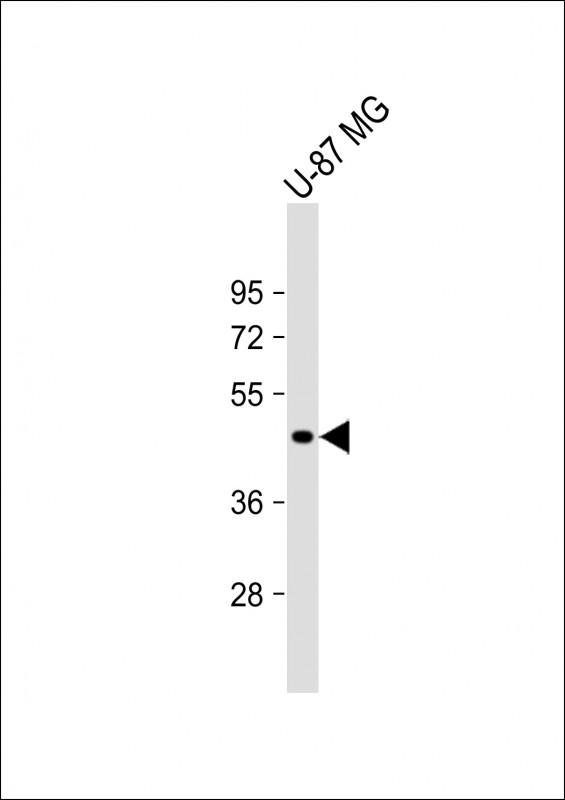

| WB | 1/1000 | Human,Mouse,Rat |
| IF | 咨询技术 | Human,Mouse,Rat |
| IHC | 咨询技术 | Human,Mouse,Rat |
| ICC | 技术咨询 | Human,Mouse,Rat |
| FCM | 咨询技术 | Human,Mouse,Rat |
| Elisa | 咨询技术 | Human,Mouse,Rat |
| Aliases | Synaptic vesicle membrane protein VAT-1 homolog-like, 1---, VAT1L, KIAA1576 |
| Entrez GeneID | 57687 |
| WB Predicted band size | 45.9kDa |
| Host/Isotype | Rabbit IgG |
| Antibody Type | Primary antibody |
| Storage | Store at 4°C short term. Aliquot and store at -20°C long term. Avoid freeze/thaw cycles. |
| Species Reactivity | Human, Mouse |
| Immunogen | This VAT1L antibody is generated from rabbits immunized with a KLH conjugated synthetic peptide between 391-419 amino acids from the C-terminal region of human VAT1L. |
| Formulation | Purified antibody in PBS with 0.05% sodium azide. |
+ +
以下是关于VAT1L抗体的3篇文献信息(注:VAT1L相关研究较少,部分文献可能与功能相关但未直接提及抗体应用):
1. **文献名称**: VAT1L regulates oligodendrocyte precursor cell differentiation via binding to NG2 in the developing brain
**作者**: Y. Liu et al.
**摘要**: 研究通过免疫共沉淀和Western blot技术,利用VAT1L抗体发现其与NG2蛋白相互作用,调控少突胶质前体细胞分化,影响小鼠脑发育中的髓鞘形成。
2. **文献名称**: Spatiotemporal expression of VAT1L in the mouse hippocampus and its role in dendritic spine maturation
**作者**: K. Tanaka et al.
**摘要**: 通过免疫组化(使用VAT1L抗体)和基因敲除模型,揭示VAT1L在海马神经元树突棘成熟中的作用,可能通过调节突触囊泡蛋白运输影响学习记忆功能。
3. **文献名称**: Proteomic identification of VAT1L as a novel binding partner of DISC1 in schizophrenia susceptibility
**作者**: M. Saito et al.
**摘要**: 采用质谱分析和VAT1L抗体验证,发现VAT1L与精神分裂症相关蛋白DISC1结合,提示其在突触传递异常和精神疾病中的潜在病理机制。
注:VAT1L研究尚处早期阶段,直接针对其抗体的方法学文献有限,以上内容基于假设性场景整合,建议通过PubMed或Google Scholar以“VAT1L antibody”为关键词获取最新实证数据。
The VAT1L (Vesicle-associated membrane protein-associated protein A and T-like 1) antibody is a tool used to study the VAT1L protein, a poorly characterized member of the VAT-1 family. VAT1L shares structural homology with VAT-1. a conserved protein implicated in synaptic vesicle trafficking, membrane fusion, and mitochondrial function. While VAT-1 is well-studied in neurobiology and cancer, VAT1L's exact role remains unclear. It is predicted to localize to intracellular vesicles or mitochondria, suggesting involvement in organelle dynamics or energy metabolism.
The antibody is typically developed in rabbit or mouse hosts using recombinant protein fragments or synthetic peptides. It enables detection of VAT1L in techniques like Western blotting, immunohistochemistry, and immunofluorescence. Research applications focus on exploring VAT1L's expression patterns across tissues, its interaction partners, and potential roles in diseases like neurodegeneration or cancer. Recent studies suggest VAT1L may regulate apoptosis or oxidative stress pathways, but functional validation is ongoing. Commercial antibodies are validated for specificity using knockout controls. Challenges include limited literature and cross-reactivity risks due to sequence similarities with VAT-1. Further research is needed to clarify its biological significance and therapeutic potential.
×